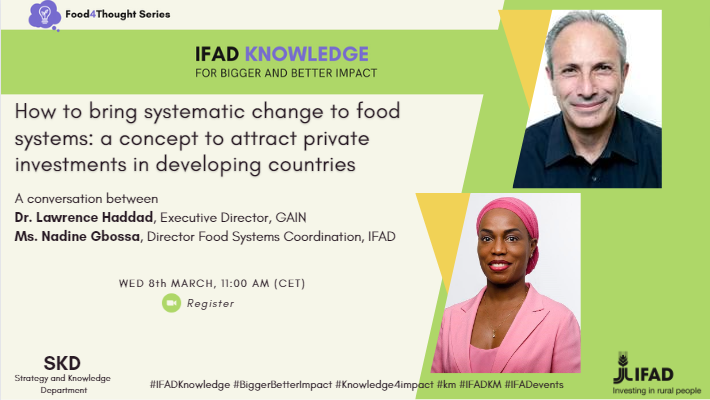SEED FUNDING JOINT PROGRAMMES
Rwanda
Resilient Food Systems: Enhanced Value Chain and Post Harvest Management





PROJECT TITLE | Resilient Food Systems: Enhanced Value Chain and Post Harvest Management |
| Context | Food systems transformation is embedded in several national policies in Rwanda, including the National Transformation Strategy, the Strategic Plan for Agriculture Transformation, the National Environment and Climate Change Policy. In 2021, Rwanda developed its National Pathway, which highlights four priority areas for the country towards 2030: ensuring food security and nutrition for all, while increasing demand for healthy diets; enhancing the environmental sustainability of food systems; improving livelihoods for farmers and all workers in food systems while building resilience to shocks; promoting inclusion of women and youth in food systems, including through enhanced financial opportunities. |
| PUNOs | FAO, WFP, IFAD |
| Contribution to SDGs | SDG 1 No Poverty; SDG 2 Zero Hunger; SDG 8 Decent Work and Economic Growth; SDG 13 Climate Action |
| Contribution to other SDG transitions | Decent Jobs and Universal Social Protection; Energy Access and Affordability |
| Duration | July 2024 – June 2025 |
| Expected financial leverage | $ 3,070,000 |
| Alignment with SG Call to Action | Policy integration; Food systems governance; Research, data, technology and innovation; Inclusive and participatory design; Private sector engagement |
| Outcomes | The JP leverages on improved post-harvest management as a strategic approach to simultaneously reduce food loss, improve incomes, and boost food availability. The JP promotes the economic integration of youth-led MSMEs and builds linkages with partners and initiatives focused on nutrition and food security to connect the dots between food production, processing and consumption. |
| Partners |
|
| Outputs |
|
IFAD Food 4 Thought Event: How to bring systematic change to food systems

©IFAD
This Food 4 Thought event was hosted by IFAD and featured a conversation with Dr. Lawrence Haddad, GAIN’s Executive Director, and Ms Nadine Gbossa, Director for Food Systems Coordination in IFAD, on how to bring systematic change to food systems. The discussion was introduced by Dr. Jyotsna Puri, Associate Vice-President of Strategy and Knowledge Department at IFAD and moderated by Lenyara Fundukova, Senior Knowledge Management Specialist at IFAD. During the event, actors and related mechanisms that can attract private sector investment in developing countries to generate a positive food systems transformation, were explored and discussed.
View the full event recording.
About the Speakers
Dr Lawrence Haddad is GAIN’s Executive Director since 2016. From September 2020 and up to the United Nations Food Systems Summit that took place on 23 September 2021, Lawrence chaired Action Track 1: Ensuring Access to Safe and Nutritious Food for All. Lawrence is also the co-convener of the Standing Together for Nutrition. Prior to GAIN, Lawrence was lead author of the Global Nutrition Report, Director of the Institute of Development Studies (IDS), and Director of the Food Consumption and Nutrition Division at IFPRI. He is the winner of the 2018 World Food Prize together with David Nabarro. Click here for more.
Ms Nadine Gbossa is a senior development professional with over 20 years’ experience dedicated to sustainable development. In October 2021, Gbossa was appointed as IFAD’s Director for the Food Systems Summit follow up. She is also the Chief of Means of Implementation with the UN Food Systems Coordination Hub. As a Country Director and Regional Head for IFAD, Gbossa worked in several African countries with vulnerable communities, governments, development partners and the private sector for inclusive growth. With IFAD in Nigeria, Gbossa managed the largest country programme in the region and she was later appointed as Director for the West and Central Africa region.
